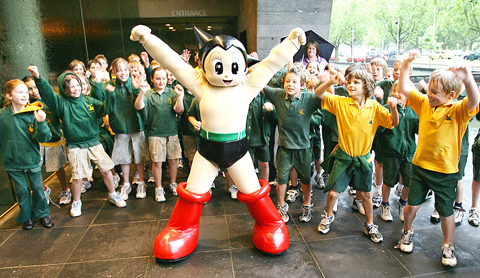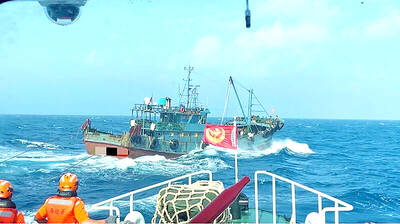When a feisty little robot named Astro Boy emerged from the Japanese comic world in the 1960s, children across the globe were charmed by his charisma and inspired by his courage.
The cartoon character used super powers to fight all manner of evil, from man-hating robots to robot-hating men, but nothing could have prepared him for the battle he now faces — Astro Boy is about to take on Hollywood.
The Hong Kong-based animation studio Imagi yesterday launched its modern 3D take on the Astro Boy story in Japanese cinemas before it goes out in the US from Oct. 23, right in the middle of the lucrative autumn cinema season.

PHOTO: AFP
Imagi’s studio heads are gambling that their US$65 million production will steal a share of the animation market dominated by the US super studios Pixar and DreamWorks — and inspire a new wave of Asian-based animation.
“Astro Boy shows the potential and the promise in the Asian animation industry and the possibilities that are here,” said Imagi’s vice-president of animation, Tim Cheung. “Talent is always around, the important thing is how it is developed and that is what you are seeing now — the talent is being developed in Asia.”
First sketched by Osamu Tezuka in 1956, Astro Boy became an instant classic of the Japanese-invented manga-style comics with its tale of a powerful little robot boy built by a scientist in the image of his deceased son. There have been a number of versions of the story produced since, most famously the 1960s series which heralded the rise of the influential Japanese “anime” style of cartoons used in television and film.
Without giving too much away, Imagi say they have taken the traditional story — which saw Astro Boy abandoned to a circus and then reborn as a superhero — and updated it not only with modern 3-D CGI technology, but with modern themes.
For their English-language version, Freddie Highmore (Charlie and the Chocolate Factory) and Oscar-winner Nicolas Cage will provide the voices for the lead roles — Astro Boy and Dr Tenma, the scientist who builds the robot.
“It’s always tricky to ask a filmmaker about their production, but I feel hugely confident,” Cheung said. “It’s very well balanced throughout. It’s rare to have movie like this where so many moments in the film are touching. Plus it has action and humor, and all that is enshrined in the story of Astro Boy — it has always had all that. It will be fairly new for the North American audience, but very familiar for the Asian audience.”
Imagi has grand plans for an Asian animation market that is looking to go global. Three of the worldwide box office’s top 10 hits this year have been CGI-animated films — with Up coming in third so far (with US$292 million in ticket sales), Monsters vs Aliens in sixth and Ice Age: Dawn of the Dinosaurs seventh, but until now, Asian animators have been content to target their own regional markets. Japan’s legendary animator Hayao Miyazaki won an Oscar in 2003 for Spirited Away and he has a cult following across the globe, but Miyazaki remains the exception.
There is good reason, says Kim Ji-seok, who programs the Asian sections at South Korea’s annual Pusan International Film Festival (PIFF), the biggest in the region.
“The status of the feature animation film in Asia, except for Japan, has been poor,” Kim said. “Some Asian countries, however, have tried to promote the animation industry on a national level. It seems to me that animated feature film production in Asia is slowly materializing, in places such as Indonesia, Malaysia, Singapore, Taiwan and the Philippines, where it was difficult to make feature animation films before.”
This year’s PIFF — which is running until Friday — features a special “Ani Asia! A Leap of Asian Feature Animation” section that features films from those smaller Asian markets.
“What these animated features provide is a kind of refreshment,” Kim said. “They can be distinguished from conventional animation from the West or Japan, and the characters and stories are aesthetically combined with each country’s cultural traditions.”
Kim says the region’s comic traditions have long inspired filmmakers, a point reinforced last month when Vanquish Motion Pictures of the US picked up the rights to DevaShard, the best-selling graphic novel series from Hong Kong.
DevaShard is based on ancient Sanskrit epics such as The Mahabharata and so far its two issues have sold out print runs of 50,000 in its home town.
Imagi is also at work on their next feature, an updated version of the Japanese anime series Gatchaman, which follows the exploits of a five-member team of superheroes and first appeared in the 1970s. The film is set for release towards the end of next year.

The Republic of China (ROC) is celebrating its 114th Double Ten National Day today, featuring military parades and a variety of performances and speeches in front of the Presidential Office in Taipei. The Taiwan Taiko Association opened the celebrations with a 100-drummer performance, including young percussionists. As per tradition, an air force Mirage 2000 fighter jet flew over the Presidential Office as a part of the performance. The Honor Guards of the ROC and its marching band also heralded in a military parade. Students from Taichung's Shin Min High School then followed with a colorful performance using floral imagery to represent Taiwan's alternate name

COGNITIVE WARFARE: Chinese fishing boats transmitting fake identification signals are meant to test Taiwan’s responses to different kinds of perceived incursions, a report said Chinese vessels are transmitting fake signals in Taiwan’s waters as a form of cognitive warfare, testing Taipei’s responses to various types of incursions, a report by the Institute for the Study of War said on Friday. Several Chinese fishing vessels transmitted fake automatic identification system (AIS) signals in Taiwan’s waters last month, with one mimicking a Russian warship and another impersonating a Chinese law enforcement vessel, the report said. Citing data from Starboard Maritime Intelligence, the report said that throughout August and last month, the Chinese fishing boat Minshiyu 06718 (閩獅漁06718) sailed through the Taiwan Strait while intermittently transmitting its own AIS

CHINESE INFILTRATION: Medical logistics is a lifeline during wartime and the reported CCP links of a major logistics company present a national security threat, an expert said The government would bolster its security check system to prevent China from infiltrating the nation’s medical cold chain, a national security official said yesterday. The official, who wished to stay anonymous, made the remarks after the Chinese-language magazine Mirror Media (鏡周刊) reported that Pharma Logistics (嘉里醫藥物流) is in charge of the medical logistics of about half of the nation’s major hospitals, including National Taiwan University Hospital and Taipei Veterans General Hospital. The company’s parent, Kerry TJ Logistics Co (嘉里大榮物流), is associated with the National Committee of the Chinese People’s Political Consultative Conference (CPPCC) and the Chinese People’s Liberation Army (PLA), the

COVETED PRIZE: The US president would be a peace prize laureate should he persuade Xi Jinping to abandon military aggression against Taiwan, William Lai said US President Donald Trump should get the Nobel Peace Prize should he be able to convince Chinese President Xi Jinping (習近平) to abandon the use of force against Taiwan, President William Lai (賴清德) told a conservative US radio show and podcast in an interview. The US is Taiwan’s most important international backer, despite the absence of formal ties, but since Trump took office earlier this year he has not announced any new arms sales to the nation. Trump could meet Xi at the APEC summit in South Korea on Oct. 31 and Nov. 1. Lai, speaking on The Clay Travis and Buck Sexton